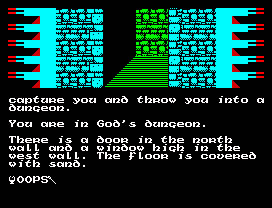Harvey Lodder &
The Quest for the Golden Eggcup

The Quest for the Golden Eggcup is a British text adventure from the 1980s that's fondly remembered by many today thanks to its release by budget game specialists Mastertronic. In March 2021, the game's author, Harvey Lodder was kind enough to spend some time talking to me about his experiences writing the two versions of the adventure...
How did you get into computing, the ZX Spectrum, and adventure games?
"It started with a christmas present of the 48K Spectrum. I had this bought for me with three games which were Ant Attack, Gangsters and Atic Atac.
The adventure games came later as I discovered them. The first one I got was Espionage Island - Adventure D. The syntax was a pain but that opened the thirst to play more. I think this stemmed from enjoying back in the day the Fighting Fantasy books such as Warlock of Firetop Mountain."
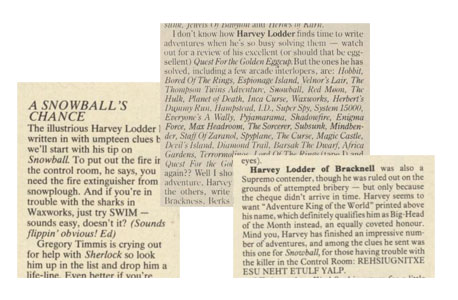 In those days if we got stuck in a game we'd have to wait for hints to appear in one of the computer magazines or, if we were lucky, we could write off to a kind soul that had volunteered to help out with specific titles. You were one such volunteer back then!
In those days if we got stuck in a game we'd have to wait for hints to appear in one of the computer magazines or, if we were lucky, we could write off to a kind soul that had volunteered to help out with specific titles. You were one such volunteer back then!
Judging from your list of solved games, you'd tackled a lot of the popular adventures of the time, especially the more difficult ones. You were offering help in most of the Melbourne House games, Level 9 adventures like Snowball, and even more obscure titles like System 15000. Did you get many stamped self-addressed envelopes winging their way to you in Bracknell, pleading for help?
"Too many but we were kids and wanted the "fame" that our name in lights would be given for the three/four lines of text in a magazine. Snowball was always an interesting one as I finished it by pure fluke, right at the end you had to have a canister in a toolbox that exploded when exposed to pressure if I recall. I had a couple of things in the toolbox and when I opened it at that spot it killed the final obstacle! System 15000 was brilliant, it was so unique and I loved the simulation of phone dial up."
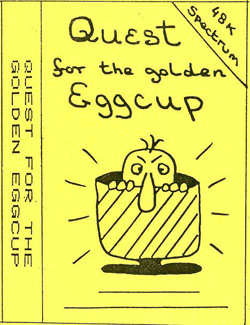 You went on to produce your own adventure, The Quest for the Golden Eggcup, using Gilsoft's excellent Quill system. Was it your first attempt at writing a text adventure? Had you had a go at using any other systems or programming methods previously?
You went on to produce your own adventure, The Quest for the Golden Eggcup, using Gilsoft's excellent Quill system. Was it your first attempt at writing a text adventure? Had you had a go at using any other systems or programming methods previously?
"The second. The first was another game on The Quill called Pi-Week The Quest based on some Automata characters. No goes on anything else previously. [Graeme Yeandle's] program of The Quill was perfect in too many ways and nothing else really came close until PAW."
You released your adventure, the Quest for the Golden Eggcup by mail order in 1986, publishing under the name Network Adventure Games, with the game packaged in a cheap, but extremely cheerful inlay. In the game credits it mentioned that you had some help from Paul Cook and Jon O'Brien?
"Paul gave the idea of the witch and Jon looked at the code to fix some spelling mistakes. I did everything else."
The game started with the player being run over by a pink panther driving a C5, they are promised reincarnation by God if they can locate his legendary Golden Eggcup.
"Yeah, I guess I was trying to be relevant then with the C5, but verging towards Monty Python stupidity!"
It's a great set-up! The original Golden Eggcup stood out for a variety of reasons. It was very well presented, especially for a home-grown Quilled game, with a neat white boxed section containing the brief location text that was followed by a clear list of exits.
"Thank you. I suffered from OCD then and was trying to present the game in a format that I would be happy with if I purchased it back then."
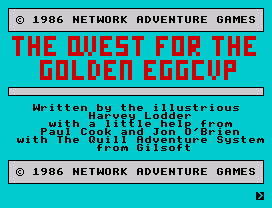 |
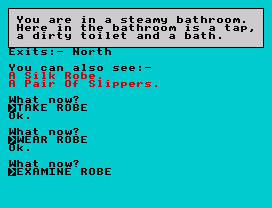 |
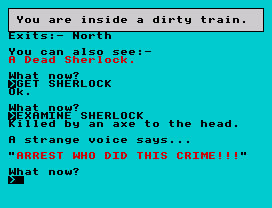 |
| (Above: The original Network Adventure Games version of The Quest for the Golden Eggcup) | ||
Above all, though, the game was genuinely funny, with plenty of humorous asides lightly scattered throughout the adventure. There were lots of references to other games, particularly the Melbourne House ones. Eggcup parodied The Hobbit's assorted troupe of wandering characters (who generally just got in your way) and poked fun at the notoriously buggy Sherlock with a dead detective that you could pick up and put in your pocket.
"Yeah thank you, everything and anything was game and I don't think I got any less stupid as I got older."
The game was beginner-friendly, but contained some nice puzzles, including a neat one involving useless objects. One of the most memorable features, often brought up in discussion threads on the Internet, was an "easter egg". If a player typed in a swear word they would find themselves locked in a very 'goblin's dungeon'-like cell. Escape was possible… Well, definitely once anyway.
"Yeah it had to have a reference to The Hobbit, I hated that bloody dungeon when I first encountered it."
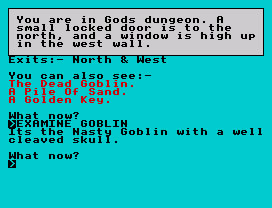 |
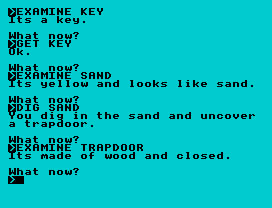 |
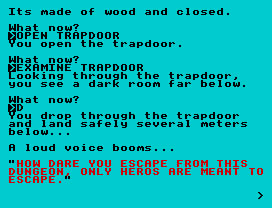 |
| (Above: The "swear" dungeon in the original Network Adventure Games version of The Quest for the Golden Eggcup) | ||
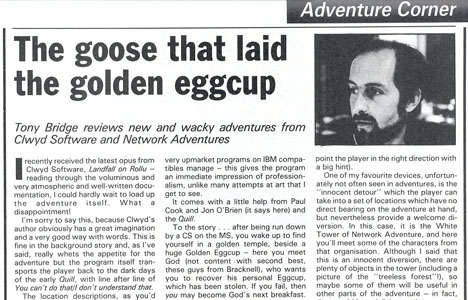 The game caught the attention of adventure columnist Mike Gerrard at Your Sinclair who gave it a glowing review in one of his "indie game" roundups, praising the aforementioned humour in particular: "Some people try to be funny and fail dismally, but not in this adventure... Worth every penny of its £1.99. this one." Did you get many orders after the YS review?
The game caught the attention of adventure columnist Mike Gerrard at Your Sinclair who gave it a glowing review in one of his "indie game" roundups, praising the aforementioned humour in particular: "Some people try to be funny and fail dismally, but not in this adventure... Worth every penny of its £1.99. this one." Did you get many orders after the YS review?
"There were a few, yes. I think it sold about 30 or so copies back then. I was pleased. There was also another review by Tony Bridge in Personal Computing Weekly."
Ah, yes. That's a great review too with Tony stating that it was "one of the best games he'd seen lately".
Enter, stage left, Nigel Brooks of Smart Egg, who had had great success with their games Serf's Tale for Players and Rigel's Revenge for Mastertronic. They were now looking for other games to satisfy the demand from interested publishers. Games that were fully complete and pretty much ready to go. How did you get involved with Nigel?
"They saw the review in Personal Computing Weekly."
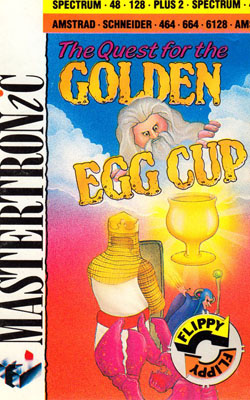 A new version of the Golden Eggcup was to be produced by Smart Egg and released by popular budget label Mastertronic. The Amstrad Computer User review mentions the game was a collaboration… How much input did you have into the work on the "remake"?
A new version of the Golden Eggcup was to be produced by Smart Egg and released by popular budget label Mastertronic. The Amstrad Computer User review mentions the game was a collaboration… How much input did you have into the work on the "remake"?
"A fair amount - however nothing to do with the graphics. I had the odd demo of them but that was a separate workstream with whoever it was they knew was doing the graphics. I had no contact with Simon."
Smart Egg started out using the Quill. In later magazine articles, they began "talking up" their own system, making quite disparaging comments about the Gilsoft creation tool. Their new codebase, called The Ballpoint, was apparently much more complicated and advanced. However, an analysis of the archived version of The Ballpoint shows that it was built directly on top of the Quill. It shares a lot of the Quill's code and even has the same menu system structure! Did you end up using the Smart Egg system directly yourself?
"Yes and it was a pain in the arse. Not user friendly and if I recall the menus were pretty much non-existent. They had me convert a game called Federation for them in it. The whole Federation game was ported by hand - it took a long time to do - but it did give me access to The Ballpoint (which I hated!)"
One aspect that was impressive about the Smart Egg system was its way of displaying graphics in the games. Pictures appeared almost instantly, unlike the slow line-and-fill of Gilsoft's Illustrator. Produced by Simon Dunston, the pictures were built using basic, reusable texture blocks… A technique that was memory efficient but still fairly effective. Although reviewers tended not to rate these graphics very highly they probably helped the game's sales… they looked good on the back of the box.
"Yeah, Simon was good with what limited capacity the systems had - I wish I'd personally met him."
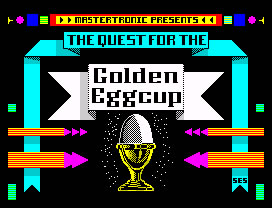 |
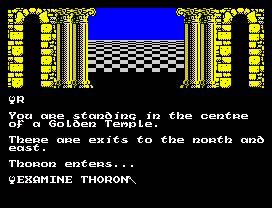 |
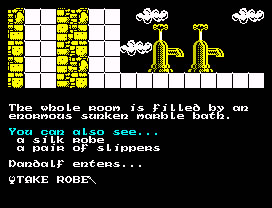 |
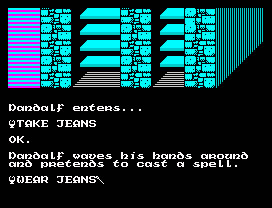 |
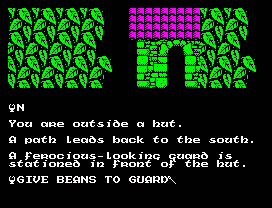 |
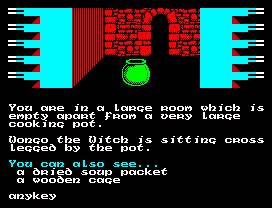 |
| (Above: The Smart Egg version of The Quest for the Golden Eggcup published by Mastertronic in 1988) | ||
The "remade" Eggcup was published in 1988 at the bargain price of £1.99, for the CPC, C64, and Spectrum; widening the reach of the original game with two additional platforms. (The C64 version even apparently even had an arcade game to play while Eggcup was loading, complete with music from the legendary Ron Hubbard.) The cover inlay of the Mastertronic release seemed to want to pitch the game as a Monty Python Holy Grail-style romp, depicting a kingly knight dealing with a warlock of some kind and a strange crab. Were you happy with how the "remake" turned out?
"Yes I was - the end product was a good product and a nice thing to look back on."
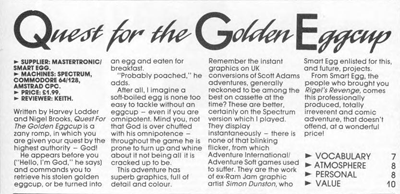 Reviews flooded in for the higher-profile Mastertronic release. And they were great reviews. Keith Campbell in C&VG gave it 10/10 for value… calling it a "totally irreverent and comic adventure, that doesn't offend" .The Games Machine's 77% indicated the game was "one that should not be missed, even by die-hard Infocom fans". Mike Gerrard in Your Sinclair gave the new version 8/10. It got 75% from Zzap!64 and Crash magazine called it a game of high calibre that was "slick and innovative", awarding it 88%. It must have been heartening to receive so many positive reviews for your work?
Reviews flooded in for the higher-profile Mastertronic release. And they were great reviews. Keith Campbell in C&VG gave it 10/10 for value… calling it a "totally irreverent and comic adventure, that doesn't offend" .The Games Machine's 77% indicated the game was "one that should not be missed, even by die-hard Infocom fans". Mike Gerrard in Your Sinclair gave the new version 8/10. It got 75% from Zzap!64 and Crash magazine called it a game of high calibre that was "slick and innovative", awarding it 88%. It must have been heartening to receive so many positive reviews for your work?
"It was always great to see people enjoy your work, adventure games I believe in some cases are harder to get right as you have to appeal to a wide range of people with intelligence that want to go on a story, go on a journey and if you get it wrong - you lose them."
As well as Eggcup, another game Quann Tulla, originally by 8th Day, was also snapped up by Nigel Brooks, given a similar graphical makeover and published by CRL as Federation… This is the game that you mentioned porting earlier. 8th Day boss Mike White has talked about the issues navigating the relationship with Smart Egg as the middleman, stating that he didn't see a penny of the royalties. I gather that you also didn't have a particularly good experience...?
"Well the full money never came and I have nothing but negative thoughts on the relationship with them. I also lost a hell of a lot more money then the little that came through using the legal route to try to recover money. No profit was ever made through this once all legal costs were paid for (with still no resolution) and it was time to step away as it was simply throwing money down the drain."
On a more positive note Eggcup seems to have been very fondly remembered, even by those that wouldn't normally have played text adventures. A quick search on social media brings up lots of people reminiscing about the game. How does it feel to have created something that has made a lasting impression?
"It's nice - it's a feel good feeling in some respects and a moment like many thousands of other people had back then. Thanks to Tim [Gilberts] for The Quill, he really did help make dreams come true."
The end of The Quest for the Golden Eggcup promised a sequel, the Egg of the Phoenix. Does anything of the Egg of the Phoenix remain? Did you have any other unfinished games back in the 1980s?
"Not after being fleeced and losing so much money."
 I believe that you returned to the world of the Golden Eggcup to produce a port using Inform in the late 90s. Did that ever get completed and released?
I believe that you returned to the world of the Golden Eggcup to produce a port using Inform in the late 90s. Did that ever get completed and released?
"I was working on a new version writing in Inform. It's still in development. I started hitting bugs with it and memory problems as well (I reckon).
Here are a couple of examples of some of the game so far...
This is the discovery of the source of light in the game.
This is the opening, here inspired by Life on Mars."
So many options are available for text adventure authors these days, particularly those who want to target older retro platforms using tools like the PAW, DAAD, or PunyInform. Are you interested in revisiting Eggcup again or working on new text adventure/interactive fiction projects?
"The revised version is still an ongoing journey and my hope is if I can get an official version off PAW on eBay one day I'll then switch to that. I so regret what I got rid of years ago and very fondly remember first getting it... I believe I ordered it at a ZX Microfair if I recall and it came sometime later."
Where did life take you after the Quest for the Golden Eggcup? Was your adventure writing experience useful?
"Well it was all IT really and carried on that journey... In terms of adventure writing skills being useful, the later Inform stuff was absolutely - it helped with coding."
My thanks go to Harvey Lodder for taking the time to answer questions about his game.
|
